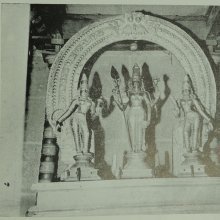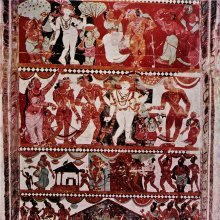Devasena, Deva-sena, Devaṣeṇa, Devasenā, Devashena: 17 definitions
Introduction:
Devasena means something in Hinduism, Sanskrit, the history of ancient India. If you want to know the exact meaning, history, etymology or English translation of this term then check out the descriptions on this page. Add your comment or reference to a book if you want to contribute to this summary article.
The Sanskrit term Devaṣeṇa can be transliterated into English as Devasena or Devashena, using the IAST transliteration scheme (?).
Images (photo gallery)
In Hinduism
Natyashastra (theatrics and dramaturgy)
Source: Wisdom Library: Nāṭya-śāstraDevasenā (देवसेना) is the name of an Apsara created for the sake of a type of dramatic perfomance. Acording to the Nāṭyaśāstra 1.46-51, after Brahmā asked Bharata for materials necessary for the Graceful Style (kaiśikī: a type of performance, or prayoga), Bharata answered “This Style cannot be practised properly by men except with the help of women”. Therefore, Brahmā created with his mind several apsaras (celestial nymphs), such as Devasenā, who were skillful in embellishing the drama.

Natyashastra (नाट्यशास्त्र, nāṭyaśāstra) refers to both the ancient Indian tradition (shastra) of performing arts, (natya—theatrics, drama, dance, music), as well as the name of a Sanskrit work dealing with these subjects. It also teaches the rules for composing Dramatic plays (nataka), construction and performance of Theater, and Poetic works (kavya).
Purana and Itihasa (epic history)
Source: archive.org: Puranic Encyclopedia1) Devasena (देवसेन).—A very intelligent king who ruled his country with Śrāvastī as his capital. (See Unmādinī).
2) Devasena (देवसेन).—Husband of Kīrtisenā. (See Kīrtisenā).
3) Devasenā (देवसेना).—Dakṣa’s daughter and wife of Subrahmaṇya and a woman of rare beauty and purity. Daityasenā and Devasenā, daughters of Dakṣa, used to enjoy themselves at Mānasa saras. One day Keśī, the asura saw them and craved for their love. Daityasenā agreed to become his wife, but Devasenā refused, and she prayed for the help of Indra, who happened to come there at the moment. Indra and Keśī fought with each other. Keśī used the club against Indra, who broke it into two with his vajrāyudha. Then Keśī hurled a mountain at Indra, who cut it also. Frightened to death Keśī then ran away with Daityasenā to safety, and Devasenā expressed her desire to Indra to have one who could defeat the Devas, Dānavas and Yakṣas as her husband. But, Indra could not find such a one in the whole universe. Indra told Brahmā about it. The Devas put their heads together and brought forth Subrahmaṇya from Śiva to be her husband. In the war between the Devas and the asuras Devasenā helped Subrahmaṇya, and the asuras were completely destroyed. (Vana Parva, Chapters 223, 224).
Source: archive.org: Shiva Purana - English TranslationDevasena (देवसेन) refers to the “army of the Gods”, according to the Śivapurāṇa 2.3.42 (“Description of the meeting of the Lord and the Mountain”).—Accordingly, as Brahmā narrated to Nārada: “[...] On seeing the army of the gods (devasena) Himavat was struck with wonder. Considering himself blessed he appeared in front of them. The gods too were struck with wonder on seeing his army. The gods and the mountains became delighted. The vast army of the mountains and the gods, O sage, on coming together shone like the eastern and western oceans in juxtaposition. [...]”.
Source: Cologne Digital Sanskrit Dictionaries: The Purana IndexDevasenā (देवसेना).—A daughter of Indra, married to Kumāra.*
- * Brahmāṇḍa-purāṇa IV. 30. 105; Matsya-purāṇa 159. 8.

The Purana (पुराण, purāṇas) refers to Sanskrit literature preserving ancient India’s vast cultural history, including historical legends, religious ceremonies, various arts and sciences. The eighteen mahapuranas total over 400,000 shlokas (metrical couplets) and date to at least several centuries BCE.
Kavya (poetry)
Source: Wisdom Library: Kathāsaritsāgara1) Devasena (देवसेन) is the name of a king of olden times whose capital was Śrāvastī, according to the Kathāsaritsāgara, chapter 15. His story is told by Rumaṇvat to Yaugandharāyaṇa in the “Story of Unmādinī”.
2) Devasena (देवसेन) is the name of a self-proclaimed “king of herdsmen”, according, to the Kathāsaritsāgara, chapter 18. Accordingly, “O King, being herdsmen we roam in the wilderness, and there we have among us a herdsman named Devasena, and he sits in a certain place in the forest on a stone seat, and says to us, ‘I am your king,’ and gives us orders. And not a man among us disobeys his orders”.
In the same chapter, Devasena occurs as the name of a king whose daughter is named Duḥkhalabdhikā. Their story was told by Udayana (king of Vatsa) in order to demonstratrate to his ministers that a brave man by himself without any support obtains prosperity.
3) Devasena (देवसेन) is the name of a rich merchant from Magadha who married Kīrtisenā: the daughter of Dhanapālita, according to the “story of Kīrtisenā and her cruel mother-in-law”, as mentioned in the Kathāsaritsāgara, chapter 29. Accordingly, “and he [Dhanapālita] took his daughter [Kīrtisenā] to Magadha and married her to a rich merchant named Devasena. And though Devasena was himself very virtuous, he had a wicked mother as mistress in his house, for his father was dead. She, when she saw that her daughter-in-law Kīrtisenā was beloved by her husband, being inflamed with anger, ill-treated her in her husband’s absence”.
The story of Devasena and Kīrtisenā was narrated to Kaliṅgasenā by Somaprabhā in order to demonstrate that “chaste women, enduring the dispensation of hostile fate, but preserving in misfortune the treasure of their virtue, and protected by the great power of their goodness, procure good fortune for their husbands and themselves”.
4) Devasena (देवसेन) is the name of a king who failed to marry the merchant’s daughter [Unmādinī], according to a story mentioned in the Kathāsaritsāgara, chapter 33. The story of Devasena was narrated to Udayana (king of Vatsa) by Yaugandharāyaṇa in order to demonstrate that “matrons cannot endure the interruption of a deep affection” demonstrated by the anecdote that “chaste women, when their beloved is attached to another, or has gone to heaven, become careless about all enjoyments and determined to die, though their intentions are inscrutable on account of the haughtiness of their character”.
The Kathāsaritsāgara (‘ocean of streams of story’), mentioning Devasena, is a famous Sanskrit epic story revolving around prince Naravāhanadatta and his quest to become the emperor of the vidyādharas (celestial beings). The work is said to have been an adaptation of Guṇāḍhya’s Bṛhatkathā consisting of 100,000 verses, which in turn is part of a larger work containing 700,000 verses.

Kavya (काव्य, kavya) refers to Sanskrit poetry, a popular ancient Indian tradition of literature. There have been many Sanskrit poets over the ages, hailing from ancient India and beyond. This topic includes mahakavya, or ‘epic poetry’ and natya, or ‘dramatic poetry’.
Shaktism (Shakta philosophy)
Source: Google Books: ManthanabhairavatantramDevasena (देवसेन) refers to one of the eight Guardians (kṣetrapāla-aṣṭaka) associated with Kāmākhya (corresponding to the eastern face of Bhairava), according to the Manthānabhairavatantra, a vast sprawling work that belongs to a corpus of Tantric texts concerned with the worship of the goddess Kubjikā.—[...] The eight Guardians (kṣetrapālāṣṭaka): Heruka, Kumāra, Kamala, Ṣaṇmukhāntaka, Kadamba, Lalita, Lambodara, Devasena.

Shakta (शाक्त, śākta) or Shaktism (śāktism) represents a tradition of Hinduism where the Goddess (Devi) is revered and worshipped. Shakta literature includes a range of scriptures, including various Agamas and Tantras, although its roots may be traced back to the Vedas.
General definition (in Hinduism)
Source: Wisdom Library: HinduismDevasenā (देवसेना, “army of the gods”):—The Sanskrit name of one of the two wifes of Ṣaṇnukha, a form of Murugan (the embodiment of skilful action). She is also known as Devakuñjarī.
India history and geography
Source: Shodhganga: Ajanta’s antiquityDevaṣeṇa (r. 455-480 CE) is a king from the Eastern Vākāṭakas (Nandivardhana branch) dynasty of ancient India. During the rule of the Vākāṭakas (founded by Vindhyaśakti), there was a burst of patronage and creative energy directed at the Ajantā caves at West-Khandesh (West-Khaṇḍeśa, modern Jalgaon) that existed since the 3rd century BCE. During this time the region was ruled by kings (e.g., Devaṣeṇa) and descendants of the Sātavāhana lineage. Devaṣeṇa was preceded by Sarvaṣeṇa II and succeeded by Hariṣeṇa.

The history of India traces the identification of countries, villages, towns and other regions of India, as well as mythology, zoology, royal dynasties, rulers, tribes, local festivities and traditions and regional languages. Ancient India enjoyed religious freedom and encourages the path of Dharma, a concept common to Buddhism, Hinduism, and Jainism.
Languages of India and abroad
Sanskrit dictionary
Source: DDSA: The practical Sanskrit-English dictionaryDevasenā (देवसेना).—
1) the army of gods.
2) Name of the wife of Skanda; स्कन्देन साक्षादिव देवसेनाम् (skandena sākṣādiva devasenām) R.7.1. (Malli.:-devasenā = skandapatnī perhaps it merely means 'the army of the gods' personified as Skanda's wife). °पतिः, °प्रियः (patiḥ, °priyaḥ) an epithet of Kārtikeya.
Devasenā is a Sanskrit compound consisting of the terms deva and senā (सेना).
Source: Cologne Digital Sanskrit Dictionaries: Shabda-Sagara Sanskrit-English DictionaryDevasenā (देवसेना).—f.
(-nā) 1. The daughter of Indra. 2. An army or host of celestials. E. deva Indra or any deity, and senā an army.
Source: Cologne Digital Sanskrit Dictionaries: Benfey Sanskrit-English DictionaryDevasenā (देवसेना).—I. f. an army of celestials, Mahābhārata 3, 14245. Ii. m. Deva-sena, a proper name, [Kathāsaritsāgara, (ed. Brockhaus.)] 15, 63. Iii. f. nā, a proper name, Mahābhārata 3, 14257.
Devasenā is a Sanskrit compound consisting of the terms deva and senā (सेना).
Source: Cologne Digital Sanskrit Dictionaries: Cappeller Sanskrit-English DictionaryDevasena (देवसेन).—[masculine] a man’s name; [feminine] nā the army or host of the gods (often person.).
Source: Cologne Digital Sanskrit Dictionaries: Aufrecht Catalogus CatalogorumDevasenā (देवसेना) as mentioned in Aufrecht’s Catalogus Catalogorum:—Kumārasambhavaṭīkā by Haricaraṇadāsa.
Source: Cologne Digital Sanskrit Dictionaries: Monier-Williams Sanskrit-English Dictionary1) Devasena (देवसेन):—[=deva-sena] [from deva] m. Name of a king of Śrāvastī, [Kathāsaritsāgara]
2) [v.s. ...] of a king of Pauṇḍra-vardhana, [ib.]
3) [v.s. ...] of a cowherd, [ib.]
4) [v.s. ...] of a, [Buddhist literature] Arhat
5) Devasenā (देवसेना):—[=deva-senā] [from deva-sena > deva] f. a host of celestials, [Ṛg-veda; Atharva-veda; Brāhmaṇa] etc. ([plural] the hosts of Deva or Īśāna, [Āpastamba-gṛhya-sūtra h. xx, 5]; -pati [cf. Lexicographers, esp. such as amarasiṃha, halāyudha, hemacandra, etc.] m. and -priya [Mahābhārata] m. Name of Skanda)
6) [v.s. ...] Name of a daughter of Prajā-pati or niece (daughter, [cf. Lexicographers, esp. such as amarasiṃha, halāyudha, hemacandra, etc.]) of Indra and wife of Skanda, [Mahābhārata; Purāṇa]
7) [v.s. ...] a particle of mūla-prakṛti, [Horace H. Wilson]
8) [v.s. ...] Name of [commentator or commentary] on [Kumāra-sambhava]
Source: Cologne Digital Sanskrit Dictionaries: Yates Sanskrit-English DictionaryDevasenā (देवसेना):—[deva-senā] (nā) 1. f. The daughter of Indra; an army of celestials.
[Sanskrit to German]
Sanskrit, also spelled संस्कृतम् (saṃskṛtam), is an ancient language of India commonly seen as the grandmother of the Indo-European language family (even English!). Closely allied with Prakrit and Pali, Sanskrit is more exhaustive in both grammar and terms and has the most extensive collection of literature in the world, greatly surpassing its sister-languages Greek and Latin.
See also (Relevant definitions)
Partial matches: Deva, Sena, Teva, Cena.
Starts with: Devasenapati, Devasenapriya, Tevacenapati.
Ends with: Vasudevasena.
Full-text (+20): Devasenapati, Daityasena, Devasenapriya, Shodashamatrika, Sena, Haricaranadasa, Parankundram, Vivekin, Valli, Devakunjari, Keshin, Shanmukha, Unmadini, Uposatha, Kirtisena, Shanmukhantaka, Mulasthana, Garbhagriha, Lalita, Sarvasena.
Relevant text
Search found 23 books and stories containing Devasena, Deva-sena, Devaṣeṇa, Devasenā, Devashena, Deva-senā; (plurals include: Devasenas, senas, Devaṣeṇas, Devasenās, Devashenas, senās). You can also click to the full overview containing English textual excerpts. Below are direct links for the most relevant articles:
Garga Samhita (English) (by Danavir Goswami)
Verse 6.2.15 < [Chapter 2 - Residence in Śrī Dvārakā]
Puranic encyclopaedia (by Vettam Mani)
The Devi Bhagavata Purana (by Swami Vijñanananda)
Chapter 46 - On the anecdote of Ṣaṣṭhī Devī < [Book 9]
Chapter 29 - On the anecdote of Sāvitrī, on gifts and on the effects of Karmas < [Book 9]
Chapter 18 - On the union of Śaṅkhacūḍa with Tulasī < [Book 9]
Satirical works of Kshemendra (study) (by Arpana Devi)
7.1. Summary of the Padmapābhṛtakam < [Chapter 1 - Introduction]
Temples of Munnur (Historical Study) (by R. Muthuraman)
Buddhist records of the Western world (Xuanzang) (by Samuel Beal)
Chapter 10 - Country of Mo-ti-pu-lo (Matipura) < [Book IV - Fifteen Countries]
Related products


